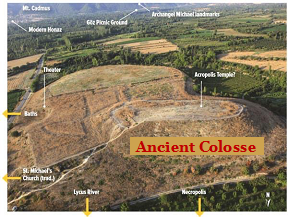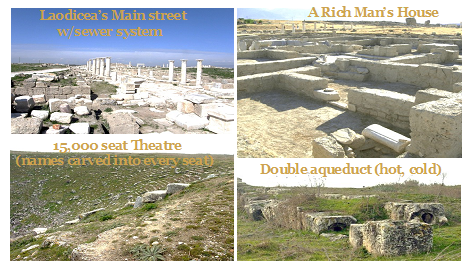Normally in our bulletins, we cover archaeological findings relevant to the passage in an attempt to provide some historical backdrop. Usually that involves a stunning discovery, with a direct connection to the sermon text. Other times, as in the case of the church at Colosse, little to no evidence remains. In fact, no archaeological digs have been undertaken. Only a large mound at the base of Turkey's Mt. Cadmus is seen (right). [1]
Usually that involves a stunning discovery, with a direct connection to the sermon text. Other times, as in the case of the church at Colosse, little to no evidence remains. In fact, no archaeological digs have been undertaken. Only a large mound at the base of Turkey's Mt. Cadmus is seen (right). [1]
Unexcavated mound of Colosse in the Lycus
river valley, in southern Anatolia, Turkey.
However, nearby Laodicea is a different matter. The apostle Paul, at the end of Colossians, requests that when this epistle is read among you, cause that it be read also in the church of the Laodiceans; and that ye likewise read the epistle from Laodicea. Apparently, he had a common concern for the two cities only a few miles apart on the same bank of the Lycus river. Historically, they were both very wealthy. The surrounding fertile land and pastures supported many flocks of sheep, and the area became a great center for the wool industry along with dying woolen garments. In fact, the city bore its name for her famous dark red wool cloth, colossinum. When Laodicea was established, it became the financial headquarters for the entire area as well as the seat of the body politic, supplanting Colosse's prominence. Two earthquakes, in AD 17 and AD 60, destroyed both cities; however, Laodicea rebuilt herself without any Roman aid. Though there were approximately 50,000 Jews in Colosse by 62 BC, her main church members were the less prosperous Gentiles, of whom was Epaphras, Philemon, Onesimus and Archippus. [2]
I have observed that where great prosperity abounds, men have time to dream up all kinds of idiotic ideas (such as gnosticism, which was a problem at Colosse). Laodicea's wealth was quite stunning by archaeological standards, as noted by the quad set of pictures below.

Laodicea's stunning remains of wealth. Colosse lay only a few miles upstream.
In addition to a public sewer system, they had two theatres for performances – one at 8,000 seats, and another at 15,000 with names carved into every seat. If that wasn't enough, it also boasted a 40,000-seat stadium. Potable water descended from Hierapolis, whose hot springs and cold fresh waters provided a practically free city-wide utility. [3] These people had time, luxury and ease on their hands.
God spoke of His dealings with creatures of comfort to Ezekiel: Behold, this was the iniquity of thy sister Sodom, pride, fulness of bread, and abundance of idleness was in her and in her daughters, neither did she strengthen the hand of the poor and needy. And they were haughty, and committed abomination before me: therefore I took them away as I saw good. Is it any wonder that nothing of significance remains?
[1] Annotated photo, https://www.drandrewjackson.com/the-new-testament-letter-of-colossians-and-the-site-of-colossae-in-modern-turkey/
[2] Source material: https://www.padfield.com/acrobat/history/laodicea.pdf
[3] Photo source: http://holdingfast.net/Book-of-Revelation?page=10
Like this? Consider sharing it to Facebook by clicking the linked icon below.
